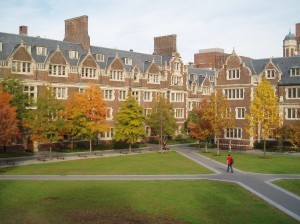Is the University of Pennsylvania paying its fair share?
It’s a question worth asking and it’s at the heart of the upcoming Philadelphia Area Jobs with Justice (JWJ) community forum, taking place Sat. May 31 at Monumental Baptist Church (4948 Locust Street). The forum, which begins at 3 p.m., will discuss Penn’s contributions (and lack thereof) to Philadelphia, as well as a campaign for the university to make PILOT (Payment in Lieu of Taxes) contributions—voluntary payments made to the city by nonprofit hospitals and universities, which are tax-exempt entities, that benefit city schools and services.
According to the labor and social justice coalition, while the rest of Philadelphia is grappling with employment insecurity, slashes to the city budget, cutbacks in public services, and a long-standing education crisis, Penn continues to prosper on and around its 994-acre campus. The JWJ points out, the Ivy League’s total endowment is valued at $7.74 billion as of the 2013 fiscal year, and its president, Amy Gutmann, makes over $2 million a year as of 2011—over $600,000 more than 2010—ranking her as one of the highest-paid university presidents in the country. The university’s total budget for the 2014 fiscal year, though, is $6.6 billion, which consists of a $3.634 billion payroll budget including benefits.
And none of that money is earmarked for PILOT contributions—at least, not since 2000. In 1995, the city and Penn struck a five-year agreement during which the university would voluntarily pay $1.93 million a year to the city as part of PILOT, but the program expired, according to the Daily Pennsylvanian. None of Philadelphia’s 2011 PILOT money came from Penn, Drexel University nor Temple University. Instead, reported Generocity, the biggest contributor was a 40-acre retirement community in Andorra called Cathedral Village that donated $272,250 of the $383,650 the city received in that year.
In response to Penn’s lack of PILOT contributions, Gutmann told DP in 2012: “We are very committed to having a big economic impact on the city. We’ve been cited as a model around this country of a university that has the most positive impact on its neighborhood and city.”
But JWJ clearly sees it differently.
“As you probably guessed, [‘Is U. Penn paying its fair share?’] is a bit of a leading question. [O]f course U. Penn isn’t paying its fair share,” the organization wrote on the event’s page. “It’s one of only two Ivies that refuse to make PILOT contributions … Well, we think it’s time to pay up.”
Registration is required for the forum. To register, click here. For more information, email director@phillyjwj.org.
–Annamarya Scaccia






May 29th, 2014 at 3:26 pm
It amazes me that we allow Ivies to gamble on the stock market tax free. However, it is the state that is owed money as they are the most capable of collecting it.
May 29th, 2014 at 4:40 pm
So one of the gripes is that UPenn, as a nonprofit, doesn’t pay property taxes? Yet this meeting is at a church, another non-profit that probably owns property, uses city services and doesn’t pay taxes.
Do large religious organizations pay PILOT? If we are going after Universities (which provide jobs, hospitals and contributes to PAS) why not consider all the property taxes we could get from the churches sitting on tax free land all over the city, too?
May 29th, 2014 at 7:05 pm
Not that I’m against the city trying to get more money from Penn, but with the $3 billion+ that Penn spends employing people (a lot of whom don’t live in Philly, granted), doesn’t that mean the city collects $50 or $60 million or more in payroll taxes every year from Penn employees? I mean, their employees aren’t exempt from the wage tax, are they?
May 30th, 2014 at 10:56 am
End tax exemptions for all non-profits!
May 30th, 2014 at 1:28 pm
@real 46er– Our focus is mega-nonprofits, because they can unquestionably afford it because they take up the the vast majority of tax-exempt private property, and because the populations they serve aren’t usually Philadelphians (especially Philadelphians from working families).
@Keith– Those taxes are definitely an important contribution to the city’s budget. The thing is, Philly’s at a point where we need to be looking at new revenue sources if we want to save our schools and adequately fund our services. PILOTs could provide tens of millions for the city, and since U. Penn claims to be a leader in community-nonprofit relations, they need to step up and lead.